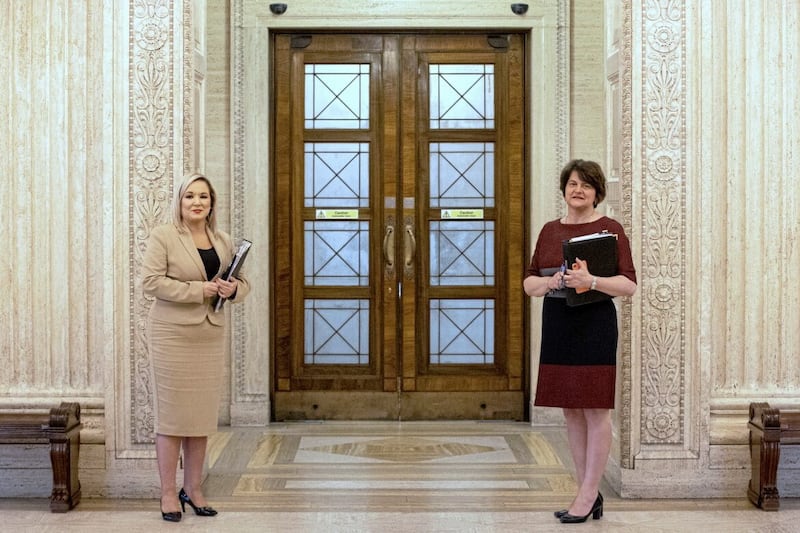PETER Robinson has been offering advice on restoring devolution. His successor as DUP leader, Arlene Foster, made an interesting contribution to the same debate in February.
Speaking on her GB News show, Foster said any major reform of power-sharing would require a referendum. She was responding to comments by Brandon Lewis, the former secretary of state, that Northern Ireland needs a system of government less vulnerable to boycotts and that reflects the recent growth of the centre ground.
A reform referendum deserves to be a more mainstream idea. Sinn Féin and the DUP oppose removing Stormont’s vetoes, while both the government and opposition at Westminster have said reform cannot be imposed without majority unionist and majority nationalist support. A referendum could bypass these objections and would be likely to succeed.
Read more:
- Analysis: Lack of consensus on shape of Stormont reform
- Conversations needed soon on Stormont reform, says former secretary of state
- Newton Emerson: Bad behaviour improves prospect of Stormont reform
Opinion polls and academic research have found two-thirds of the public supports removing Stormont’s large-party vetoes. Support is highest amongst Sinn Féin voters, despite it being the party most consistently opposed to this change.
A focus group study was conducted by Queen’s University Belfast and Liverpool University in 2021 to drill down into public attitudes to reform. Participants started out firmly in favour of removing vetoes but wanted to keep some form of power-sharing once they considered the implications of simple majority rule.

Proposals such as Alliance’s ‘optional mandatory coalition’, where the two largest parties would be offered the top two executive posts but would no longer have to accept them, would fit the bill. The study found this type of reform would potentially have the support of majorities of unionists, nationalists and ‘others’.
The Good Friday Agreement was approved by a referendum in 1998, so changing the rules by the same means would have legitimacy. Far more fanciful suggestions have entered everyday discussion – joint authority, for example – as frustration has grown over Stormont’s apparently intractable instability.
Read more:
- Newton Emerson: SDLP slogan should be 'Vote Colum, get Doug and Naomi'
- Newton Emerson: Competence or culture war? The DUP's dilemma
- Newton Emerson: Has the SDLP given up on Stormont?
Something stranger is about to happen next year, whether or not Stormont is still suspended, when the first regular vote must take place among assembly members on continuing large parts of the Windsor Framework. Although this vote will certainly pass, the very concept of a regional veto over a UK-EU treaty, let alone operation of the EU single market, was considered preposterous when it was raised during the Brexit protocol negotiations.
The politics of holding a reform referendum are in many ways simpler if Stormont’s collapse drags on. Deadlock would warrant the British and Irish governments devising their own reform proposals and putting them to the public.
The mere threat of this might be enough to force the DUP back to work and compel it and Sinn Féin to engage with reform. Legally, there is nothing to stop change being imposed on the Northern Ireland parties. Both governments own the Good Friday Agreement and Westminster retains full sovereignty over Stormont.

A Sinn Féin government in Dublin need not be fatal to reform – it would face embarrassment across Ireland and beyond if it insisted on upholding the DUP’s veto. Agreeing new rules with Britain over unionism’s head would appeal more to Sinn Féin’s sense of destiny.
A referendum becomes harder to picture if devolution returns in the coming weeks or months. Reform would still be necessary to prevent another collapse but it would be left to the Stormont parties to arrange, via the interminable review mechanisms of the assembly and the executive.
Sinn Féin and the DUP would never voluntarily agree to give up their vetoes and the governments would see no urgency to enforce change until it was too late.
Other parties would have to find ways of keeping up the pressure. Alliance has a good legal case and a better ethical case that reform is essential for equal treatment of its voters. Regular and ongoing reviews of Stormont’s rules are built into the Agreement and have scarcely been delivered. The UUP and the SDLP might join Alliance in making these arguments.
However, they would need a plausible mechanism by which change could be delivered against the wishes of one or both of the largest parties. A referendum is the obvious answer, even if only as a rallying call or a way to concentrate minds.
Proponents of reform should be inserting the idea into public and political conversation.








